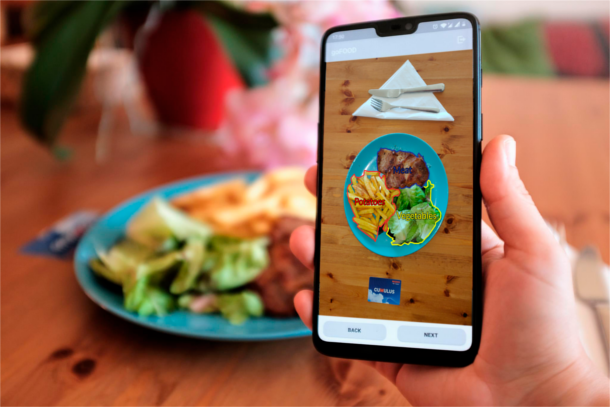
Decrypting Delicious Meals – “Artificial Intelligence for Dietary Assessment”
Do you know how many calories are in a serving of steak, mashed potatoes and green beans? Do you know the carbohydrate content of a freshly baked apple pie? Most of us presumably do not know, and looking at the expanding waistlines around the world, most of us would prefer not to. But for most insulin-dependent diabetics, ignorance about their daily diet is not an option. With every meal, it is not the pleasure of having lovely food, but the immediate need to calculate the carbohydrate content and the corresponding insulin dose. This is vital to avoid the serious side effects of incorrect carbohydrate estimation and insulin dose. For most diabetics, negotiating this as part of work canteens, restaurants and holidays, can be a challenge.
Since 2008, the team of AI in Health and Nutrition (former Diabetes Technology Research - DTR) is working among others to empower diabetic patients: GoCARB, a smartphone App that harnesses the synergy of AI and smartphone technologies, to give actionable data to users on carbohydrates. The prototype worked as follows: The user places a reference object next to the dish, and takes two photographs. A series of algorithms detect and recognize the food and estimate the corresponding volume. Once you know the volume and food type and using nutrient databases, you can calculate the carbohydrate content. Preclinical and cinical studies have shown that this is superior to getting the diabetic patient to estimate the carbohydrate content and that glucose control is then more precise, while the achieved accuracy is comparable to dieticians.
AI and computer vision for dietary monitoring and assessment, the result of 10 years of basic, applied and translational research. The team has reached an agreement with an international diabetes care company on the further development of the system for patient, hospital and use in clinical trials.On going work includes adapting and extending the already developed technology to monitor malnutrition in hospitals and dietary monitoring and assessment for a broad spectrum of users with diverse needs, due to the age, health status and living environment.
For more information, refer to goFOOD.